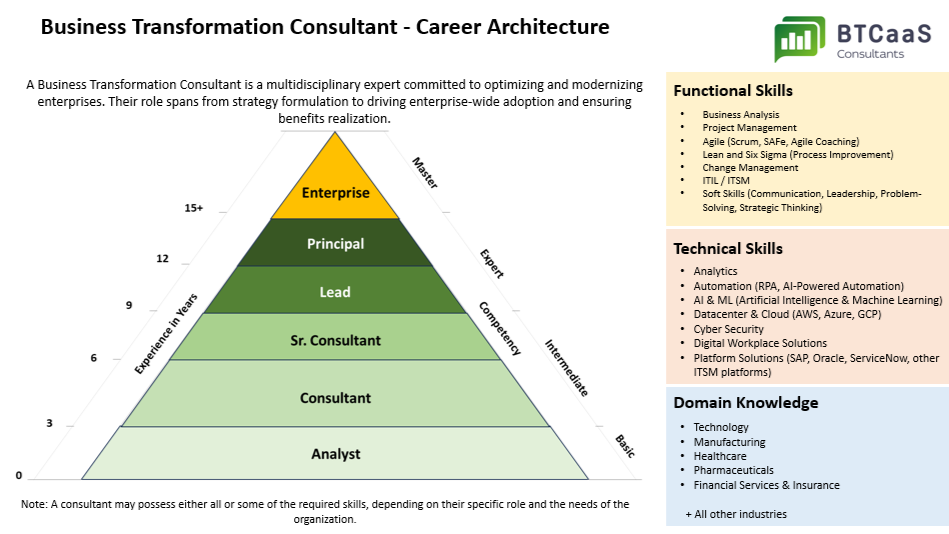
Business Transformation Consulting is a multidisciplinary field that integrates various functional and technical skills to optimize and modernize enterprises. The role spans strategy formulation, enterprise-wide adoption, and benefits realization, making it a crucial area for organizations undergoing significant change. The career architecture for Business Transformation Consultants (BTC) defines the progression path, skill sets, and learning requirements for aspiring professionals in this field. This article aims to outline the career structure, competencies, and learning paths for individuals and businesses looking to develop expertise in business transformation.
Career Progression and Experience Levels
The career path for Business Transformation Consultants is structured into six levels, each corresponding to increasing experience, competency, and responsibility:
- Analyst (0-3 Years) Entry-level role focused on foundational skills and basic knowledge acquisition. Involves supporting projects with data gathering, analysis, and reporting.
- Consultant (3-6 Years) Develops intermediate skills in project management, business analysis, and technical domains. Takes on more responsibilities in project execution and client interactions.
- Senior Consultant (6-9 Years) Gains expertise in managing complex projects and driving business outcomes. Acts as a key contributor to strategy formulation and implementation.
- Lead Consultant (9-12 Years) Leads transformation initiatives and serves as the primary client contact. Provides expert guidance on complex business challenges and solutions.
- Principal Consultant (12-15 Years) Strategizes and oversees large-scale transformation programs. Engages in thought leadership and business development.
- Enterprise Consultant (15+ Years) Master-level professional with deep expertise across multiple domains. Influences organizational strategy and global transformation efforts.
Core Competencies and Skills
Business Transformation Consultants need a combination of functional and technical skills to excel in their roles. The required competencies evolve with career progression, as outlined below:
- Functional Skills –> Business Analysis: Understanding business needs and translating them into actionable requirements. Project Management: Planning, executing, and closing projects effectively. Agile Methodologies: Implementing agile practices like Scrum, SAFe, and Agile Coaching. Lean Six Sigma: Driving process improvement using Lean and Six Sigma methodologies. Change Management: Facilitating organizational change and stakeholder engagement. ITIL/ITSM: Managing IT services in line with best practices. Soft Skills: Communication, leadership, problem-solving, and strategic thinking.
- Technical Skills –> Analytics: Leveraging data for insights and decision-making. Automation: Implementing RPA and AI-powered automation solutions. AI & ML: Using Artificial Intelligence and Machine Learning to enhance business processes. Datacenter & Cloud: Managing cloud infrastructures such as AWS, Azure, and GCP. Cybersecurity: Protecting enterprise data and systems from threats. Digital Workplace Solutions: Enhancing collaboration and productivity through digital tools. Platform Solutions: Implementing and managing platforms like SAP, Oracle, and ServiceNow.
- Domain Knowledge –> Mastery of industry-specific knowledge in Technology, Manufacturing, Healthcare, Pharmaceuticals, and Financial Services & Insurance. This knowledge allows consultants to provide tailored solutions and insights to different sectors.
Certification and Learning Paths
The journey to becoming a Business Transformation Consultant involves acquiring relevant certifications and developing a diverse skill set. The table below outlines the competencies required at each career level and the corresponding certifications:

Building Learning Paths for Aspiring Consultants and Businesses
The demand for skilled Business Transformation Consultants is increasing as organizations strive for agility and innovation. To support this, we are developing comprehensive learning paths that cater to both individuals looking to enter this field and organizations seeking trained professionals.
- For Aspiring Consultants Foundational Programs: Courses and certifications that cover essential skills in business analysis, project management, and IT service management. Advanced Learning: Specialized training in areas like AI & ML, automation, and cloud solutions. Soft Skills Development: Workshops on communication, leadership, and strategic thinking.
- For Businesses Customized Training Solutions: Tailored programs to upskill existing employees in line with organizational goals. Assessment and Certification: Evaluation of current skill levels and certification paths to ensure competence in business transformation.
Conclusion
The Business Transformation Consulting career architecture provides a clear and structured path for professionals to develop the necessary skills and expertise required for success. With the right mix of functional, technical, and domain knowledge, aspiring consultants can progress through various levels, ultimately becoming masters in their field. Our initiative to build learning paths for individuals and businesses aims to create a robust talent pool of transformation consultants ready to tackle the challenges of the modern enterprise.
If you are looking to embark on a career in business transformation or seeking to enhance your organization’s transformation capabilities, explore our learning paths and certification programs tailored to your needs.
Contact Us
If you are interested in learning more about Business Transformation Consulting or exploring our tailored learning paths and certification programs, please reach out to us https://btcaasc.com/contact-us/
Our team is here to assist you with your queries and guide you through the process of building a successful career in business transformation.
